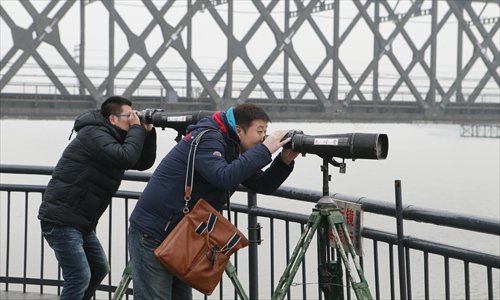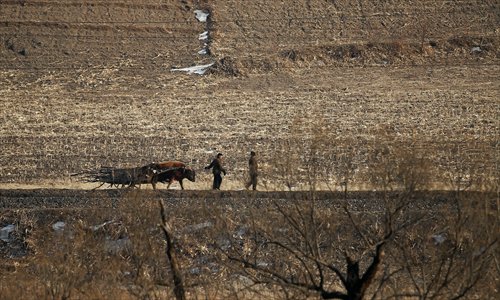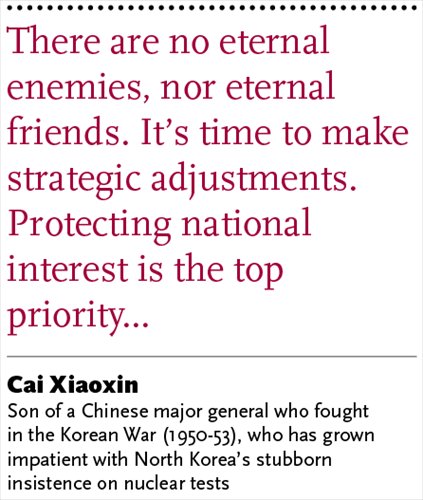Nuclear tests, border crimes change Chinese people’s attitude to N.Korea
Chinese and North Koreans used to be as "close as teeth and lips," following China's participation in the Korean War in the 1950s. But as China opted for an open market and as its economy boomed, and North Korea continued to pursue nuclear weapons, Chinese people's view of North Korea has become less rosy.

Chinese tourists use telescopes to peep into the life of North Koreans across the Yalu River in Dandong, Liaoning Province. Photo: Li Hao/GT
A bleak landscape, drab single-storey farmhouses and vigilant residents - seen from the Chinese city of Dandong, North Korea's Sinuiju, on the opposite side of the Yalu River, isn't much of a scenic spot.
But this won't stop Chinese travelers from paying 80 yuan ($12.3) each to take a 40-minute, windy boat tour on the river, just so that they can peep into the daily lives of their enigmatic neighbors.
The boat isn't allowed to dock on North Korean soil, but it goes close enough for the passengers to see what people are doing on the other side.
As the boat approached the North Korean waterfront, the tour guide on the boat, a middle-aged man, yelled into the loudspeaker: "Look at the old-fashioned tractors and ox carts. Don't they remind you of China in the 1960s?"
"North Korea is so short of food that even the mountain tops are used to grow crops. And look over there. See? A North Korean man is unloading ox feces," the guide exclaimed.
As he spoke, the 60-odd Chinese tourists moved over to one side of the boat and started to snap pictures of the far bank and the North Korean farmers with their mobile phones. The dozens of binoculars on the boat, touted by the tour guide, were soon sold to those who were eager to have a clearer look at the farmers' activities.
Most of the North Korean farmers they were watching looked indifferently back at the tourists, accustomed to the boats which come here four to five times a day, fully loaded with curious Chinese tourists. The only one who reacted was a North Korean border guard, who raised his gun in mock anger, apparently unhappy to be gawked at as if he were an animal in a zoo.

North Korean farmers are seen from China across the border. Photo: Cui Meng/GT
Lips and teeth
"It's so sad. It's depressing to see the lives they live," a young woman said after the tour.
"We're so lucky to have gone through the reform and opening-up, or we might end up just like that today," a middle-aged man from East China's Jiangsu Province, who was on a business trip to Dandong, told the Global Times.
Most Chinese tourists to the North Korean border feel a complex range of emotions toward their neighbor that includes a sense of sympathy and scorn.
But no one would deny that North Korea, China's secluded, sometimes troublesome neighbor, reminds them of China's past. The two countries share a similar history of struggles, a common ideology and the same enemies. In the 1950s, after China's participation in the Korean War (1950-53), the two countries had a relationship that would vacillate between closeness - such as the signing of the China-North Korean Mutual Aid and Cooperation Friendship Treaty in 1961 - and more cool ties, as Pyongyang played Moscow and Beijing off against each other for its maximum benefit.
Older Chinese people can still remember that from the 1950s to the 1970s, the Chinese government glorified the relationship between Chinese and North Koreans as "a friendship that is sealed by blood," and said that the two countries were so close that they were like "lips and teeth," sharing the same destiny. Until today, Kim Il-sung remains the most mentioned foreign leader of all time in the People's Daily, the Communist Party of China's official publication, according to a recent study.
"In the 1950s and the 60s, most ordinary Chinese had a deep friendly feeling toward North Korea and to Kim Il-sung, its founding father," Lü Chao, director of the North and South Korea Research Center at the Liaoning Academy of Social Sciences, told the Global Times.

Changing attitude
But today that is distant memory. As China embraced a market economy in the 1970s and its economy soared, North Korea's growth remained stagnant. The collapse of the Soviet Union and a series of natural disasters further intensified its decline in the 1980s and 1990s.
In terms of politics, China no longer solely used ideology to determine whether a country is its friend or enemy, and Beijing and Pyongyang drifted even further apart after China established official diplomatic relations with South Korea in 1992.
The friendship between the Chinese and North Korean people is no longer talked about in the Chinese media, and the rapport between them has increasingly been replaced by estrangement and mistrust.
This has deepened especially after North Korea's fourth nuclear test this year, according to experts.
"In recent years, especially after North Korea's nuclear test this year, the attitude of people in Northeast China toward North Korea has gone through a major change. Chinese people are increasingly worried about the potential risks that these tests can bring to them," Lü Chao said.
"The constant artificial earthquakes in the Korean Peninsula could trigger Changbai Mountain, an active volcano, to erupt. If that happens, it will threaten all the people in Jilin Province (which borders North Korea)," Lü worried.
In 2013, after North Korea launched its third nuclear test, which resulted in a magnitude-5.1 earthquake in the northern Korean Peninsula, concerned citizens of Northeast China gathered at the North Korean consulate in Shenyang, Liaoning Province, protesting against its nuclear tests.
The Chinese government also seems to have lost its tolerance, as it accepted the United Nations Security Council's Resolution 2270, approved on March 2, which contains some of the strongest sanctions ever adopted against Pyongyang, hoping to push the country towards denuclearization.
Hua Chunying, spokeswomen for China's Ministry of Foreign Affairs, said China "firmly opposes" the nuclear tests, and that North Korea should cease any action that may deteriorate the situation on the Korean Peninsula.
A number of violent incidents near the border perpetrated by North Koreans have also soured Chinese people's attitude to their neighbor. Last month, a North Korean diplomat killed two Chinese nationals in a car accident in Dandong, AFP reported. And last April, three North Korean soldiers killed three Chinese citizens in Helong, Jilin after they crossed the border illegally to steal food and money. A local taxi driver told the Global Times in a previous interview that many have moved out of border villages, fearing attacks from North Korean intruders.
Cui Chenghao, a North Korean parody account on Sina Weibo, is one of the most popular accounts on the website with over 4.8 million followers. Most of its posts are written in the mock tone of a defensive, indignant North Korean who likes to heap accolades on North Korean leader and pours scorn on the rest of the world.
Growing impatience
Not every Chinese, however, shares such a derisive attitude to North Korea. For Cai Xiaoxin, son of Cai Changyuan, a major general who fought in the Korean War, North Korea is a country to which he still feels a strong emotional attachment.
"People of my father's generation had a deep relationship with North Koreans … the North Korean people supported the Chinese volunteer army wholeheartedly during the Korean War, while Chinese soldiers showed their internationalism through their assistance," he told the Global Times.
His father's experience and his attachment to North Korea prompted him to begin research into the Korean War after he grew up, and he used to defend North Korea on Sina Weibo when Chinese or Western media reported on the negative side of the regime.
But recently, even he started to grow frustrated with North Korea's stubborn insistence on nuclear tests. When he reposted reports about North Korea's nuclear tests, he posted angry comments, "There are no eternal enemies, nor eternal friends. It's time to make strategic adjustments. Protecting national interest is the top priority..."
When interviewed by the Global Times, Cai said his attitude towards North Korea hasn't changed, but he has now had a deeper understanding of the country in recent years. "The divergence between China and North Korea has become more open and thorny," he said.
Newspaper headline: Friendship tested